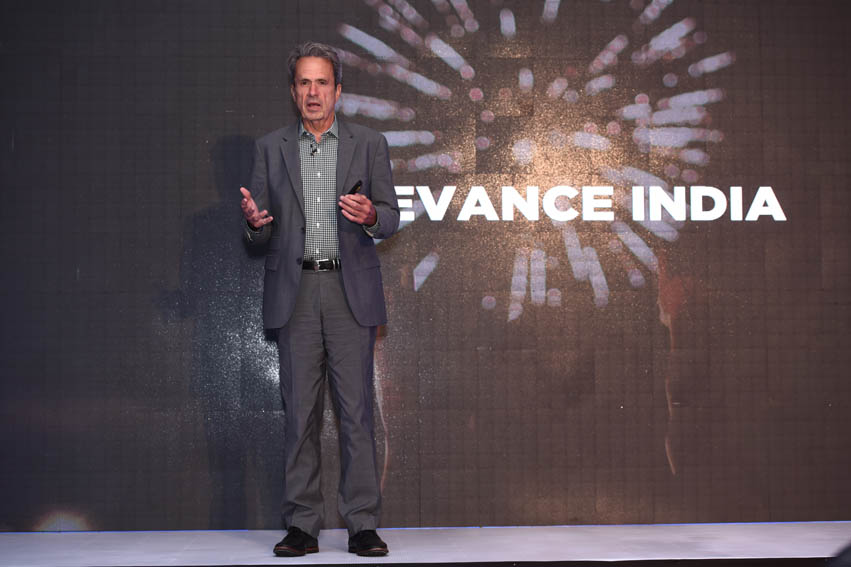GolinOpinion launches Relevance in India: a study that helps brands stay relevant
 GolinOpinion, the PR division of PointNine Lintas, has released its first marketing product, Relevance India. At an event in Mumbai, Fred Cook (pictured), global Chairman, Golin unveiled the Relevance framework which is being rolled out globally. The research was conducted in 13 markets, including India, covering over 13,000 respondents. The first round of data from the study indicates that in the battle for relevance, truth is having a moment of truth. Golin’s global research focused on three categories that touch billions of lives every day: social media, personal banking and automotive.
GolinOpinion, the PR division of PointNine Lintas, has released its first marketing product, Relevance India. At an event in Mumbai, Fred Cook (pictured), global Chairman, Golin unveiled the Relevance framework which is being rolled out globally. The research was conducted in 13 markets, including India, covering over 13,000 respondents. The first round of data from the study indicates that in the battle for relevance, truth is having a moment of truth. Golin’s global research focused on three categories that touch billions of lives every day: social media, personal banking and automotive.
The one dimension that is currently driving relevance across all categories is popularity: being talked about and recommended by others showing that talkability trumps truth.
Cook said, “Relevance is what attracts and keeps people paying attention to what brands have to say and moves them to act. This is something that we, as marketers and communicators, can directly impact. We’ve been studying, and perfecting the art of analyzing relevance for years because we understand that it is the most important measurement of a brand. Our research indicates that despite people being continually let down by the perceived trustworthiness and truthfulness of brands, they continue to buy their products and services.”
The study includes India and the data has been mapped across 13 countries throwing up some interesting similarities and anomalies. GolinOpinion has taken the research framework and customised it to a dashboard for brands to monitor their health on the 15 parameters of Relevance. Clients in India can subscribe to Relevance to add their product category and brands to the Relevance Dashboard.
 Vikas Mehta, CEO, PointNine Lintas (pictured left), said, “Finding a unified metric that can measure the impact of multiple marketing initiatives is one of the biggest challenges today’s marketers face. In Relevance, I believe GolinOpinion has found a viable choice that replaces data analysis with data analytics. It’s a great way for any brand to find out where they stand vs. competition, locally or globally.”
Vikas Mehta, CEO, PointNine Lintas (pictured left), said, “Finding a unified metric that can measure the impact of multiple marketing initiatives is one of the biggest challenges today’s marketers face. In Relevance, I believe GolinOpinion has found a viable choice that replaces data analysis with data analytics. It’s a great way for any brand to find out where they stand vs. competition, locally or globally.”
Ameer Ismail, Chief Growth officer, PointNine Lintas and President GolinOpinion said, “As the landscape changes rapidly and as brand managers or communication professionals it is extremely important to have data based insights to decide the interventions that are important for the brand and its agency partners. This is tool is designed to give brands an edge.”
Conducting a brand audit, or an ongoing consumer track is a tedious and expensive way for brand managers to find out the health of their brand, making it a luxury only the bigger brands can indulge in. Relevance is fast, robust and yet, easy to use.
Mehta aded, “Today we have access to Tools, Talent and Technology to replace periodic data collection with real-time data. Most brand tracks today are like an annual health check a brand does. They tell you everything in hindsight. Our vision for Relevance is foresight. We want to make it the FitBit of brand health that every brand manager can access.”
Developmental work is being done in Chicago and Mumbai, to further improve functionalities of the tool including real-time data integration.
Global Relevance Study
After three years of research, in partnership with the USC Annenberg School for Journalism and Communications, Golin’s study of 13,000 people in 13 markets on four continents including India, uncovered what drives relevance for categories and brands across the globe. The survey population encompassed millennials (18-34), Gen-x (35-54) and boomers (55+).
In India
The India data, that covered three categories, threw up some interesting aspects:
People around the world believe that their ideal brand would deliver on being trustworthy (ethical, moral, honest and truthful however according to the research, study the reality tells a different story. Of the most relevant brands studied, 0% met the ideal when it came to being trustworthy; while people are seeking it, leading brands aren’t seen as relevant. 91% of the most relevant brands studied exceed the expectation when it comes to being popular. This is a part of a major shift.
Having lost faith in brands and institutions, people are looking to each other, to their trusted tribes – friends, family, advocates and influencers – for validation in the choices they are making. Popularity isn’t a frivolous, fleeting dimension. Talkability means putting a premium on the people who will vouch for and recommend your brand.
Within the three categories studied it was found that social media category, research found that people don’t need truth; they want to be entertained. People prefer local banking over global – and since all banks are under-delivering on the ideal, unique relevance drivers in this category have emerged. And the automotive category struggles to have a breakout relevance brand leader.
An ideal banking brand in India is Trustworthy, Effective and Transparent. As with other categories, respondents scored brands very similarly to one another, though SBI scores higher against the ideal and exceeds expectations on Essential and Popular. None other bank in 12 other countries, where the research was done, scored so high on trust.
The automotive sector which covered global brands, shows Honda as a clear Relevance leader in India, followed by a close competition between Toyota and Ford. Nissan has low relevance, while Fiat is barely known. In India, an “ideal” automotive brand is Trustworthy, Effective, Authentic and Innovative. However, there is little difference in how consumers score each brand.
Social media is a highly-relevant category overall in India, with Facebook and YouTube ranking at the top in relevance. Local channel Hike is less relevant than global channels.
Macro global trends included:
Screens win out over people
· Social media (59%) and television (57%) consistently ranked first and second above “word of mouth from friends and family” (45%) as the most relevant sources of news and information
Word of mouth sees gender differences
· Word of mouth from friends and family is more relevant to women (50%) than men (39%)
People are drawn to pragmatic and funny
· The top characteristics of information people found relevant were useful/practical (54%), informative (53%), and funny (35%), beating out others like inspiring, shocking and exciting
The Relevance Fingerprint
Using a proprietary methodology, Golin was able to uncover and understand the Relevance Landscape and Fingerprint (see details on methodology below) for each of the three categories they studied – including which brands have higher than average enthusiasm in their category. “We selected three industries that are powering the global economies of communications, finance and transportation in order to get a wide-ranging view of how consumers relate to relevant brands and categories,” said Neal Flieger, Managing Director of Golin’s Washington, D.C. office and head of GolIntel, Golin’s dedicated research team. “In the coming years, we will examine additional categories of business and industry in order to continue to paint a broad picture of what makes a brand relevant.”
About the Relevance Methodology
Using proprietary methodology, Golin examines relevance in two ways: through a Relevance Landscape and Relevance Fingerprint. By applying an
algorithm designed to identify true relevance of brands in the mind of consumers, Golin can plot the relevance landscape of a category: how competitive brands are relevant to different consumer groups relative to each other. Through the Relevance Fingerprint, Golin has the ability to showcase how a brand is relevant to consumers by scoring against 15 dimensions that have been tested and confirmed to consistently drive brand relevance across all markets and cultures. These 15 ‘DNA building blocks’ of relevance combine in different ways and to different degrees to create unique “Relevance Fingerprints” for every brand and category. By understanding how relevant a brand is to its competitors and what drives that relevance, Golin can help brands build and maintain critical relationships with their target audiences.
